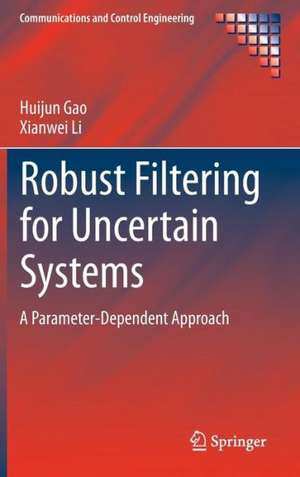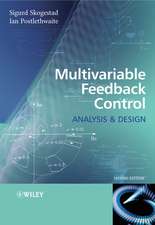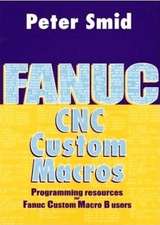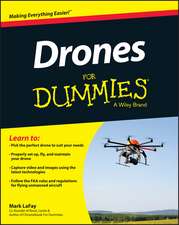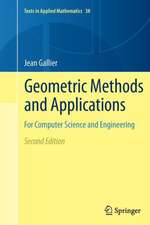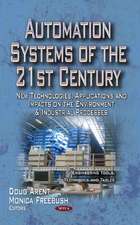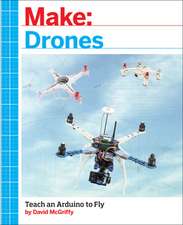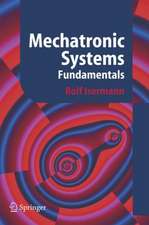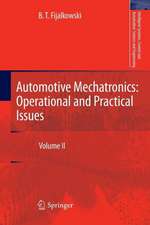Robust Filtering for Uncertain Systems: A Parameter-Dependent Approach: Communications and Control Engineering
Autor Huijun Gao, Xianwei Lien Limba Engleză Hardback – 24 apr 2014
· design approaches to robust filters arranged according to varying complexity level and emphasizing robust filtering inthe parameter-dependent framework for the first time;
· guidance on the use of special realistic phenomena or factors to describe problems more accurately and to improve filtering performance;
· a unified linear matrix inequality formulation of design approaches for easy and effective filter design;
· demonstration of the techniques of matrix decoupling technique, the generalized Kalman‒Yakubovich‒Popov lemma, the free weighting matrix technique and the delay modelling approach, in robust filtering;
· numerous easy-to-follow simulation examples, graphical and tabular illustrations to help the reader understand the filter design approaches developed; and
· an account of emerging issues on robust filtering for research to inspire future investigation.
Robust Filtering for Uncertain Systems will be of interest to academic researchers specializing in linear, robust and optimal control and estimation and to practitioners working in tracking and network control or signal filtering, detection and estimation. Graduate students learning control and systems theory, signal processing or applied mathematics will also find the book to be a valuable resource.
| Toate formatele și edițiile | Preț | Express |
|---|---|---|
| Paperback (1) | 639.25 lei 43-57 zile | |
| Springer International Publishing – 23 aug 2016 | 639.25 lei 43-57 zile | |
| Hardback (1) | 649.87 lei 43-57 zile | |
| Springer International Publishing – 24 apr 2014 | 649.87 lei 43-57 zile |
Din seria Communications and Control Engineering
- 15%
 Preț: 659.70 lei
Preț: 659.70 lei - 20%
 Preț: 879.74 lei
Preț: 879.74 lei - 18%
 Preț: 953.65 lei
Preț: 953.65 lei - 18%
 Preț: 1117.03 lei
Preț: 1117.03 lei - 9%
 Preț: 1385.77 lei
Preț: 1385.77 lei - 18%
 Preț: 1128.08 lei
Preț: 1128.08 lei - 18%
 Preț: 953.65 lei
Preț: 953.65 lei - 15%
 Preț: 656.89 lei
Preț: 656.89 lei - 18%
 Preț: 896.52 lei
Preț: 896.52 lei - 18%
 Preț: 1113.26 lei
Preț: 1113.26 lei - 18%
 Preț: 1388.22 lei
Preț: 1388.22 lei - 15%
 Preț: 647.27 lei
Preț: 647.27 lei - 18%
 Preț: 954.45 lei
Preț: 954.45 lei - 18%
 Preț: 1231.47 lei
Preț: 1231.47 lei - 18%
 Preț: 948.92 lei
Preț: 948.92 lei - 18%
 Preț: 1232.57 lei
Preț: 1232.57 lei - 18%
 Preț: 1127.28 lei
Preț: 1127.28 lei - 15%
 Preț: 643.34 lei
Preț: 643.34 lei - 18%
 Preț: 1401.30 lei
Preț: 1401.30 lei - 15%
 Preț: 651.51 lei
Preț: 651.51 lei - 20%
 Preț: 1454.07 lei
Preț: 1454.07 lei - 18%
 Preț: 948.79 lei
Preț: 948.79 lei - 18%
 Preț: 1233.06 lei
Preț: 1233.06 lei - 18%
 Preț: 947.85 lei
Preț: 947.85 lei - 18%
 Preț: 950.96 lei
Preț: 950.96 lei - 18%
 Preț: 956.99 lei
Preț: 956.99 lei - 15%
 Preț: 644.18 lei
Preț: 644.18 lei - 18%
 Preț: 946.87 lei
Preț: 946.87 lei - 18%
 Preț: 951.14 lei
Preț: 951.14 lei - 18%
 Preț: 961.55 lei
Preț: 961.55 lei - 15%
 Preț: 644.18 lei
Preț: 644.18 lei - 20%
 Preț: 990.80 lei
Preț: 990.80 lei - 18%
 Preț: 1006.72 lei
Preț: 1006.72 lei - 18%
 Preț: 942.44 lei
Preț: 942.44 lei - 18%
 Preț: 1233.06 lei
Preț: 1233.06 lei - 15%
 Preț: 641.85 lei
Preț: 641.85 lei - 18%
 Preț: 957.75 lei
Preț: 957.75 lei - 15%
 Preț: 649.87 lei
Preț: 649.87 lei - 18%
 Preț: 958.07 lei
Preț: 958.07 lei - 18%
 Preț: 1117.99 lei
Preț: 1117.99 lei - 18%
 Preț: 1395.94 lei
Preț: 1395.94 lei - 18%
 Preț: 781.62 lei
Preț: 781.62 lei - 18%
 Preț: 953.20 lei
Preț: 953.20 lei - 18%
 Preț: 1109.78 lei
Preț: 1109.78 lei
Preț: 649.87 lei
Preț vechi: 764.55 lei
-15% Nou
Puncte Express: 975
Preț estimativ în valută:
124.39€ • 135.16$ • 104.56£
124.39€ • 135.16$ • 104.56£
Carte tipărită la comandă
Livrare economică 21 aprilie-05 mai
Preluare comenzi: 021 569.72.76
Specificații
ISBN-13: 9783319059020
ISBN-10: 3319059025
Pagini: 272
Ilustrații: XVI, 253 p. 45 illus., 18 illus. in color.
Dimensiuni: 155 x 235 x 20 mm
Greutate: 0.68 kg
Ediția:2014
Editura: Springer International Publishing
Colecția Springer
Seria Communications and Control Engineering
Locul publicării:Cham, Switzerland
ISBN-10: 3319059025
Pagini: 272
Ilustrații: XVI, 253 p. 45 illus., 18 illus. in color.
Dimensiuni: 155 x 235 x 20 mm
Greutate: 0.68 kg
Ediția:2014
Editura: Springer International Publishing
Colecția Springer
Seria Communications and Control Engineering
Locul publicării:Cham, Switzerland
Public țintă
ResearchCuprins
Introduction.- Part I Quadratic and Parameter-Dependent Filter Design.- Quadratic Robust Filter Design.- Parameter-Dependent Robust Filter Design.- Part II Robust Filtering for Time-Delay Systems and 2-D Systems.- Robust Filtering for Continuous-Time Time-Delay Systems.- Robust Filtering for Discrete-Time Time-Delay Systems.- Robust Filtering for Uncertain 2-D Systems.- Part III New Problems in Robust Filtering.- Robust Estimation with Limited Communication Capacity.- Finite-Frequency H-infinity Filtering for Time-Delay Systems.- Conclusion.
Recenzii
“In order to help the reader to get a better understanding of the presented material, in each section there are included numerous algorithms associated to the theorems and tables summarizing the properties which appear in illustrative examples … . references are given at the end of each chapter … . The book is very dense in its content. … The book aims to offer the research engineers and graduate students an excellent tool.” (Dumitru Stanomir, zbMATH 1335.93001, 2016)
Notă biografică
Professor Huijun Gao received the Ph.D. degree in control science and engineering from Harbin Institute of Technology, China, in 2005. From November 2003 to August 2004, he was a Research Associate with the Department of Mechanical Engineering, The University of Hong Kong. From October 2005 to September 2007, he was an Alberta Ingenuity Fellow with the Department of Electrical and Computer Engineering, University of Alberta, Canada. Since November 2004, he has been with Harbin Institute of Technology, where he is currently a Professor and director of the Research Institute of Intelligent Control and Systems. Since January 2009 he has been an Honorary Professor with the Department of Mechanical Engineering, The University of Hong Kong.
Professor Gao’s research interests include network-based control, robust control and filter theory, time-delay systems and their engineering applications. He has published more than 150 SCI-indexed papers in peer-reviewed international journals,and his publications have received more than 4000 citations with H-index 40 (web of science) and 10000 citations with H-index 56 (google scholar). He has received several academic and teaching awards, including the National Outstanding Doctoral Thesis Award in 2007 from the Ministry of Education of China, the National Natural Science Award of China in 2008, the Outstanding Teacher Award of Heilongjiang in 2009 from the Education Department of Heilongjiang Province, the Tan Kah Kee Young Scientist Award in 2012 from the Tan Kah Kee Young Science Foundation, the Distinguished Professor of Yangtze River Scholar in 2013 from Ministry of Education of China and the IEEE IES David Irwin Early Career Award in 2013 from the IEEE Industrial Electronics Society. He was a recipient of the Alberta Ingenuity Fellowship, the University of Alberta Dorothy J. Killam Memorial Postdoctoral Fellow Prize and Honorary Izaak Walton Killam Memorial Postdoctoral Fellowship in 2005 from the University of Alberta and a recipient of the National Outstanding Youth Science Fund in 2008.
Professor Gao serves as an Associate Editor for Automatica, IEEE Transactions on Industrial Electronics, IEEE/ASME Transactions on Mechatronics, IEEE Transactions on Cybernetics, IEEE Transactions on Control Systems Technology, IEEE Transactions on Fuzzy Systems, IEEE Transactions on Circuits and Systems - I, International Journal of Systems Science, Circuits, Systems & Signal Processing and the Journal of the Franklin Institute. He is a Senior Member of the IEEE and is serving on the Administrative Committee of IEEE Industrial Electronics Society. He also serves as a member of program committee for many international conferences. He was nominated as an appreciated reviewer for IEEE Transactions on Signal Processing in 2006 and an outstanding reviewer for IEEE Transactions on Automatic Control in 2008-2010 and for the journal Automatica in 2007.
Professor Gao’s research interests include network-based control, robust control and filter theory, time-delay systems and their engineering applications. He has published more than 150 SCI-indexed papers in peer-reviewed international journals,and his publications have received more than 4000 citations with H-index 40 (web of science) and 10000 citations with H-index 56 (google scholar). He has received several academic and teaching awards, including the National Outstanding Doctoral Thesis Award in 2007 from the Ministry of Education of China, the National Natural Science Award of China in 2008, the Outstanding Teacher Award of Heilongjiang in 2009 from the Education Department of Heilongjiang Province, the Tan Kah Kee Young Scientist Award in 2012 from the Tan Kah Kee Young Science Foundation, the Distinguished Professor of Yangtze River Scholar in 2013 from Ministry of Education of China and the IEEE IES David Irwin Early Career Award in 2013 from the IEEE Industrial Electronics Society. He was a recipient of the Alberta Ingenuity Fellowship, the University of Alberta Dorothy J. Killam Memorial Postdoctoral Fellow Prize and Honorary Izaak Walton Killam Memorial Postdoctoral Fellowship in 2005 from the University of Alberta and a recipient of the National Outstanding Youth Science Fund in 2008.
Professor Gao serves as an Associate Editor for Automatica, IEEE Transactions on Industrial Electronics, IEEE/ASME Transactions on Mechatronics, IEEE Transactions on Cybernetics, IEEE Transactions on Control Systems Technology, IEEE Transactions on Fuzzy Systems, IEEE Transactions on Circuits and Systems - I, International Journal of Systems Science, Circuits, Systems & Signal Processing and the Journal of the Franklin Institute. He is a Senior Member of the IEEE and is serving on the Administrative Committee of IEEE Industrial Electronics Society. He also serves as a member of program committee for many international conferences. He was nominated as an appreciated reviewer for IEEE Transactions on Signal Processing in 2006 and an outstanding reviewer for IEEE Transactions on Automatic Control in 2008-2010 and for the journal Automatica in 2007.
Textul de pe ultima copertă
This monograph provides the reader with a systematic treatment of robust filter design, a key issue in systems, control and signal processing, because of the fact that the inevitable presence of uncertainty in system and signal models often degrades the filtering performance and may even cause instability. The methods described are therefore not subject to the rigorous assumptions of traditional Kalman filtering. The monograph is concerned with robust filtering for various dynamical systems with parametric uncertainties, and focuses on parameter-dependent approaches to filter design. Classical filtering schemes, like H2 filtering and H¥ filtering, are addressed, and emerging issues such as robust filtering with constraints on communication channels and signal frequency characteristics are discussed. The text features:
· design approaches to robust filters arranged according to varying complexity level, and emphasizing robust filteringin the parameter-dependent framework for the first time;
· guidance on the use of special realistic phenomena or factors to describe problems more accurately and to improve filtering performance;
· a unified linear matrix inequality formulation of design approaches for easy and effective filter design;
· demonstration of the techniques of matrix decoupling technique, the generalized Kalman‒Yakubovich‒Popov lemma, the free weighting matrix technique, and the delay modelling approach, in robust filtering;
· numerous easy-to-follow simulation examples, graphical and tabular illustrations to help the reader understand the filter design approaches developed; and
· an account of emerging issues on robust filtering for research to inspire future investigation.
Robust Filtering for Uncertain Systems will be of interest to academic researchers specializing in linear, robust and optimal control and estimation and topractitioners working in tracking and network control or signal filtering, detection and estimation. Graduate students learning control and systems theory, signal processing or applied mathematics will also find the book to be a valuable resource.
The Communications and Control Engineering series reports major technological advances which have potential for great impact in the fields of communication and control. It reflects research in industrial and academic institutions around the world so that the readership can exploit new possibilities as they become available.
· design approaches to robust filters arranged according to varying complexity level, and emphasizing robust filteringin the parameter-dependent framework for the first time;
· guidance on the use of special realistic phenomena or factors to describe problems more accurately and to improve filtering performance;
· a unified linear matrix inequality formulation of design approaches for easy and effective filter design;
· demonstration of the techniques of matrix decoupling technique, the generalized Kalman‒Yakubovich‒Popov lemma, the free weighting matrix technique, and the delay modelling approach, in robust filtering;
· numerous easy-to-follow simulation examples, graphical and tabular illustrations to help the reader understand the filter design approaches developed; and
· an account of emerging issues on robust filtering for research to inspire future investigation.
Robust Filtering for Uncertain Systems will be of interest to academic researchers specializing in linear, robust and optimal control and estimation and topractitioners working in tracking and network control or signal filtering, detection and estimation. Graduate students learning control and systems theory, signal processing or applied mathematics will also find the book to be a valuable resource.
The Communications and Control Engineering series reports major technological advances which have potential for great impact in the fields of communication and control. It reflects research in industrial and academic institutions around the world so that the readership can exploit new possibilities as they become available.
Caracteristici
Couches all it’s control design approaches in terms of popular and easy-to-implement linear matrix inequality problems Filter designs presented in increasing complexity allow readers full flexibility in their choice of appropriate method Numerous simulation examples give readers clear and easy-to-follow demonstrations of the filter designs developed Makes problem specification more accurate and improves filter performance by enumerating and dealing with realistic causes of system uncertainty Includes supplementary material: sn.pub/extras
